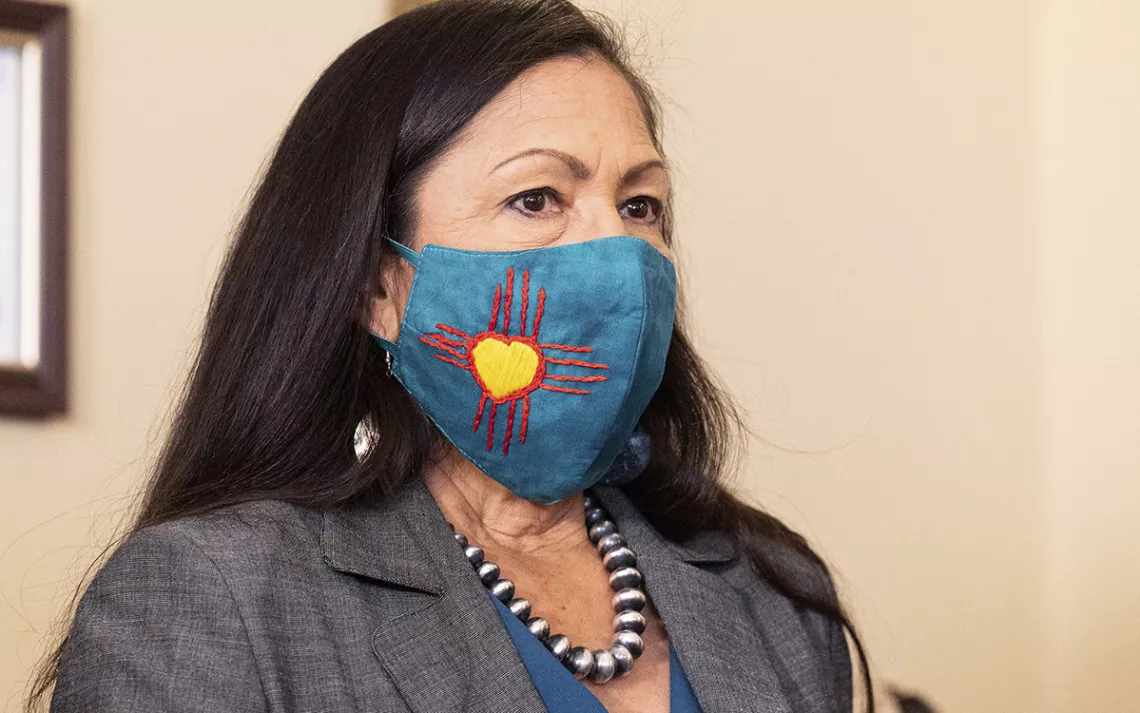A Climate Action All-Star Team
The Biden-Harris picks for environment and climate-related cabinet posts are just who we need

US representative Deb Haaland (D-N.Mex.) | Photo by Michael Brochstein/Sipa USA via AP Images
Over the past couple of days, President-Elect Biden announced a crop of climate-focused picks to lead the EPA, Council on Environmental Quality, Department of the Interior, and more. It’s been an exciting, heartening moment for all of us who worked so hard to get him elected. The climate movement showed up for Joe Biden; now, he’s showing up for us.
In many ways, these picks are historic. North Carolina Department of Environmental Quality leader Michael Regan would become the first Black man and first Southerner to lead the EPA. Brenda Mallory, currently head of regulatory affairs at the Southern Environmental Law Center, would be the first Black chair of the Council on Environmental Quality. And Representative Deb Haaland would be both the first Indigenous woman to become a cabinet secretary and the first to lead the Department of the Interior. Together, they’ll make a cabinet with an unprecedented focus on combating climate change and environmental injustice, helmed by people with lived experiences of the challenges this country faces.
The EPA plays a central role in protecting all Americans from harmful pollution and the impacts of climate change. Its administrator sets its priorities; Biden’s pick, Michael Regan, brings a strong focus on clean energy, environmental justice, and cleanup of environmentally destructive waste. As leader of North Carolina’s Department of Environmental Quality, he negotiated the nation’s largest coal ash excavation with Duke Energy and rejected the fracked gas Mountain Valley Pipeline extension. After seeing firsthand how toxic waste and environmental destruction hits low-income communities and communities of color hardest, he established an environmental justice advisory board to tackle the problem.
For his leadership in addressing these issues, the Sierra Club’s North Carolina Chapter awarded him its Distinguished Achievement Award this past September, which honors a person in public service for particular acts of importance to conservation or the environment. We look forward to working with Regan’s EPA to undo Trump’s disastrous rollbacks, institute strong public health protections, especially for vulnerable communities, and ramp up the fight against climate change.
The Department of the Interior, which oversees national parks, public and tribal lands, and conservation efforts, can also be an important partner in mitigating the climate crisis. Right now, drilling and fracking on our public lands make them a major contributor to climate change—but a focus on conservation and stewardship could turn them into carbon sinks.
A member of the Laguna Pueblo Tribe, Haaland brings with her a record of championing the environment and public lands, and supporting Indigenous-led struggles for control over their lands and waters, including at Standing Rock and Bears Ears. She has the chance to make Biden’s campaign promise to halt all new oil and gas leasing on public lands a reality and to turn our public lands into part of the climate solution by conserving 30 percent of them by 2030. And I have little doubt she’ll follow through: While in the House, she was one of the original cosponsors of a bill to protect 30 percent of US lands by 2030.
After four years of the Trump administration targeting sacred Native sites for drilling, fracking, and a disastrous border wall, Biden has picked a leader for the Interior Department who is uniquely positioned to repair relationships between the US and its First Nations. And we shouldn’t forget that the Department of the Interior has a history of inflicting harm on Native nations that stretches for more than a century before Trump. Appointing an Indigenous woman to lead it is an important first step toward righting the wrongs of the past and charting a better future.
Even when a Biden pick wasn't historic on the basis of identity, they are historic because of what they reveal about the administration’s approach to tackling the climate crisis. With this latest round of nominees, Biden has shown once again that he understands that the climate crisis is an intersectional issue. It touches the economy, public health, racial justice, and much more, and it requires an unprecedented whole-government approach.
That’s why it’s great that Biden has chosen a stellar leader to captain his whole-government approach: former EPA administrator and current NRDC CEO Gina McCarthy. During her time at the EPA, McCarthy instituted the Clean Power Plan, the first national set of rules to reduce carbon pollution from coal plants, as well as numerous other protections against the toxic chemicals that harm people and the planet. In her new role as Biden’s climate czar, McCarthy will be charged with harnessing the substantial powers of every government agency to tackle the climate crisis.
Gina McCarthy’s deputy, Ali Zaidi, a Pakistani immigrant and Obama White House veteran who is currently New York's deputy secretary for energy and environment, is also a champion for clean energy. They will make a dynamic duo to tackle climate change domestically.
On the international front, the appointment of Secretary John Kerry as a climate envoy and part of the National Security Council ensures that climate change is viewed not only as a threat to ecosystems and the environment but as a threat to our national security. Having been the top diplomat and a key negotiator of the Paris Agreement, Secretary Kerry will not need introduction to world leaders and top diplomats when negotiating climate actions with other nations. There is almost no one else in the United States for whom that is true.
Biden’s environmental picks are not only historic. They offer us allies in every agency focused on environmental protection and climate change. Their whole-government approach gives us the opportunity to enlist a whole new set of partners in the fight against climate catastrophe. These are people we can work with as we take on the great challenges our country now faces, and work to build a just, equitable, and sustainable future.
 The Magazine of The Sierra Club
The Magazine of The Sierra Club



